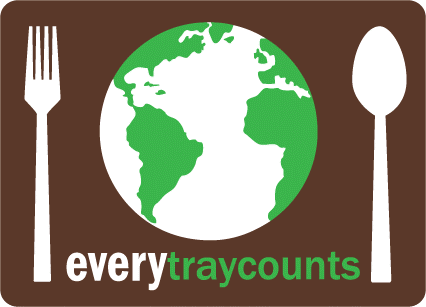Every Tray Counts (ETC) is dedicated to working with children, parents, and communities to work with North Carolina school districts to engage in responsible purchasing and waste diversion practices. Our goals are to remove polystyrene trays and other potentially harmful non-compostable products from schools, help to ingrain “reduce-reuse-recycle-compost” concepts into the school lunchroom and educational curriculum, and engage private businesses and governmental agencies to create an entrenched commitment to divert waste from landfills by using cost-effective waste diversion strategies.
Our efforts have been focused on waste audits, lunch room pilots, and education at schools with a boots-on-the-ground approach. Since we began, our pilot programs have been designed to provide data to the school and the district so that they can increase sustainability and provide financial accountability. It is also to demonstrate that using a compost line in the lunch room is not added work, but different work- therefore it is possible. Every Tray Counts gathers information regarding the quantity of waste generated in school cafeterias to obtain an understanding of how this waste is managed both at the school and after it is hauled away.. We are currently working at Kingswood Elementary School in Cary in the Wake County school district.
ETC has developed a strategy that can help any district or school move more quickly and with more information than is possible by themselves. For this reason, we have been asked to develop a school toolkit so we can help others begin on their own. We recognize that not all schools can go the same distance, in the same time period, and in the same way with lunchroom waste diversion. The “Schoolkit for Composting” will provide a road map for any group, parent, school, or community to explore issues of food waste, composting, tray options, and recycling in the school lunchroom. Tapping into expertise from schools, local government representatives, environmental groups, PTA, and other organizations, the toolkit will be specific to NC schools. Each school doesn’t always have the same barriers or opportunities; a toolkit provides options. Barriers commonly include lack of information, lack of coordination among resources, lack of volunteers, and varying waste diversion capabilities. As more schools begin a compostable tray/ compost diversion model, opportunities can include savings from trash contracts, savings from buying sustainable products in bulk, and increased environmental knowledge through science and math curriculum. This will connect all interested schools in North Carolina to each other.
The Schoolkit is a combination of different media. It includes a pamphlet that is designed as a how-to manual with step-by-step instructions. This pamphlet will be on our website and available to be downloaded or printed. It, along with several other helpful items, will also be available to be shipped by ETC. It includes power point presentations that schools can use to explain ideas and financial information about public schools, trash expenses, and cost- shifting. It includes videos about the lunch line protocol, composting, and compost facilities. It includes downloadable forms and posters. It is a multi-use set of usable and educational materials.
ETC is already an important resource for any parent, community group, or school. We provide a road map to improve sustainability in the school lunch room. Our goal is for all schools to eventually incorporate reusable or compostable trays and food waste diversion and recycling in their budgets. We know that the initial increased costs are removed over time, and very quickly there are savings to the district. This idea will be sustainable on its own, as we have seen in some districts across the state and the country, and the savings have grown. Educational programs about sustainable practices, already available by many institutional educational resources, can be integrated into the math and science curricula.
Please help us complete this. Your contribution of any amount will help us to finish the first NC Schoolkit for Composting, a worthwhile investment n NC’s future- its children.
